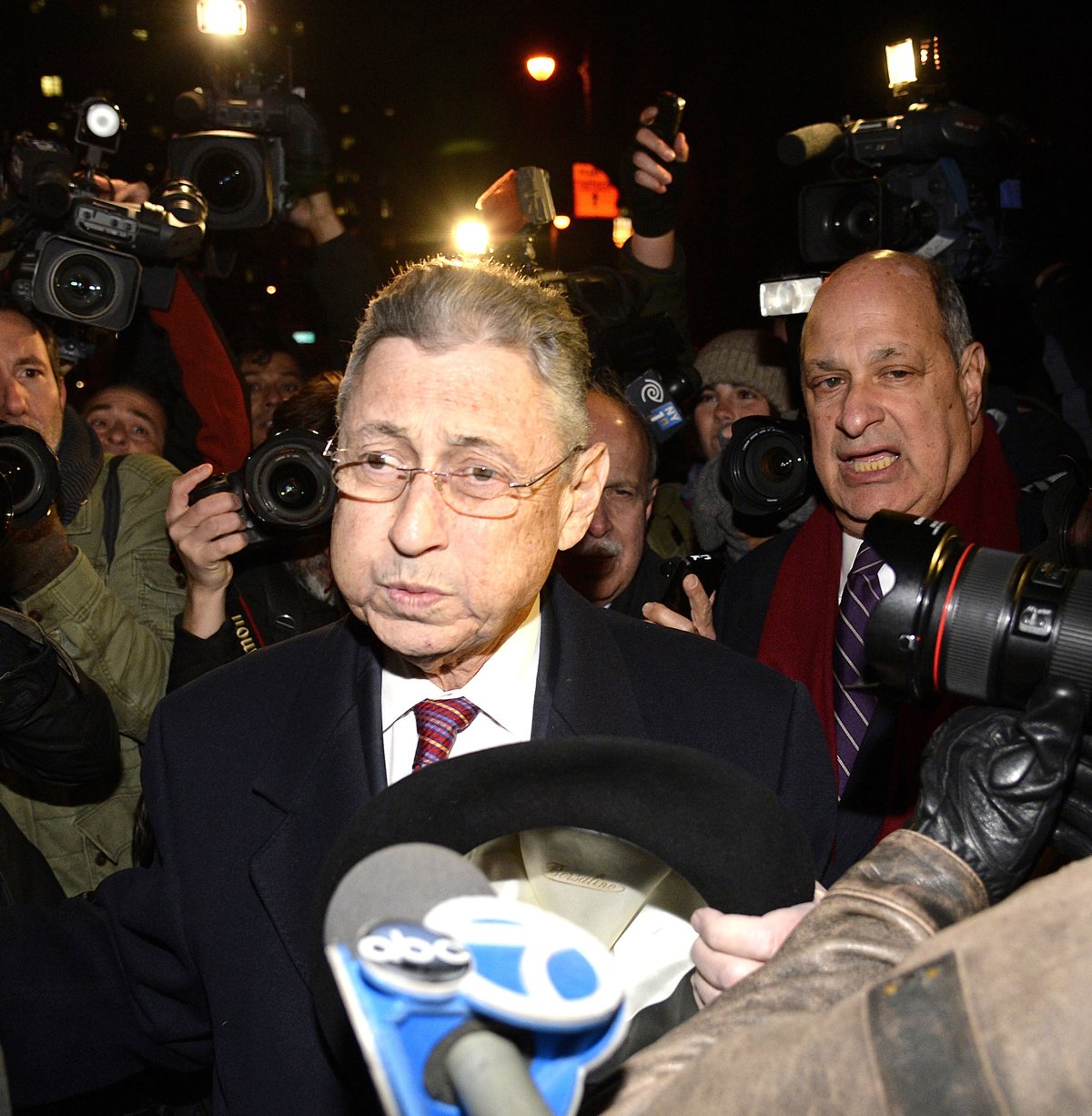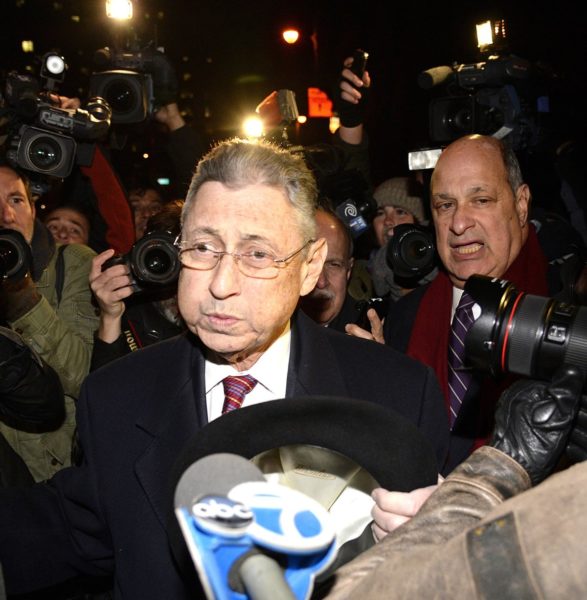
Former Assembly Speaker Sheldon Silver last December after his conviction on multiple federal counts of corruption. Following the verdict, he was immediately stripped of his political position.
BY MARY REINHOLZ | A unanimous ruling by the Supreme Court of the United States overturning the 2014 conviction of former Virginia Governor Bob McDonnell on corruption charges could lead to a new trial for fallen former Assembly Speaker Sheldon Silver, according to legal experts.
Silver, a lifelong Lower East Side resident, was sentenced in May by a federal judge to 12 years in prison for accepting around $5 million in bribes and kickbacks in two schemes involving his outside work as a private attorney.
McDonnell and his wife, Maureen, had been convicted for accepting $165,000 and lavish gifts from a wealthy Virginia businessman in exchange for promoting his dietary supplement.
But in a June 27 decision written by John Roberts, the Supreme Court’s chief justice, the court said that McDonnells’s conduct did not rise to the narrower definition of what constitutes a corrupt official act.
“There is no doubt that this case is distasteful; it may be worse than that,” Roberts opined. “But our concern is not with tawdry tales of Ferraris, Rolexes and ball gowns. It is instead with the broader implications of the government’s boundless interpretation of the federal bribery statute.”
Roberts wrote in his opinion that government prosecutors overreach when they find illegal quid pro quos in routine activities by elected officials for their benefactors.
“In the government’s view, nearly anything a public official accepts — from a campaign contribution to lunch — counts as a quid; and nearly everything a public official does — from arranging a meeting to inviting a guest to an event — counts as a quo,” Roberts said. “But conscientious public officials arrange meetings for constituents, contact other officials on their behalf and include them in events all the time.”
Gerald B. Lefcourt, a prominent Manhattan criminal defense lawyer, won a 1993 acquittal on appeal for ousted New York State Assembly Speaker Melvin Miller. Miller had been convicted on eight out of nine felony charges for cheating clients at his law firm out of real estate investments. Lefcourt said, in his opinion, Silver had “a shot” at exoneration by a higher court.
Lefcourt said that while Silver’s case was “factually different” from the McDonnells’, the Supreme Court had ruled that “all these things that legislators do are not in and of themselves wrong, and there has to be an official connection to a quid pro quo, such as money and gifts.”
The attorney noted that Silver, a liberal Democrat and fixture in the state Legislature for 40 years, had steered $500,000 in two state grants to a cancer doctor in exchange for referral of patients to a Downtown personal injury law firm that employed the powerful pol as a part-time attorney.
“But I don’t know if the jury was told what an official act is and how they should consider it,” he said. “According to the Supreme Court [decision], juries have to be told that official acts are not enough: There has to be a substantial connection to a quid pro quo. And the doctor said there was no quid pro quo.”
Veteran north Brooklyn Assemblymember Joseph Lentol, a former Kings County prosecutor, chairs the Assembly’s Committee on Codes, which reviews and evaluates all the state’s criminal justice legislation. He said he was “optimistic” that Silver, a former longtime colleague, had a chance at vindication as a result of the SCOTUS decision.
Lentol also noted, in a telephone interview, that the prosecution’s “star witness” against Silver, the aforementioned cancer doctor, had said at trial that he didn’t regard the $500,000 in state grants he received with Silver’s help as a quid pro quo and that “he didn’t expect a grant.”
“This was his testimony and it was central to Silver’s conviction,” Lentol said. “The federal statutes are so vague on honest-services fraud that the prosecutors were able to get a conviction. That was probably true in Virginia. The Supreme Court was itching to put prosecutors in their place.”
Lentol said it was “striking” that the court’s decision was unanimous.
Silver’s quid pro quo case and that of former state Senate Majority Leader Dean Skelos were prosecuted by the office of Preet Bharara, U.S. attorney for the Southern District of New York. While some media pundits characterized the SCOTUS decision as a body blow to Bharara’s wide-ranging corruption probes, his media team claimed the court’s ruling in the McDonnell case would not jeopardize the government’s cases against the two fallen New York lawmakers.
“While we are reviewing the McDonnell decision, the official actions that led to the convictions of Sheldon Silver and Dean Skelos fall squarely within the definition set forth by the Supreme Court today,” read a terse statement issued by spokesperson Nick Biase at the U.S. Department of Justice, the umbrella agency for the U.S. Attorney for the Southern District.
For her part, Susan Lerner, executive director for good-government group Common Cause New York, denounced the court ruling.
“The Supreme Court lives in a fantasyland that defies the commonsense understanding of two New York juries,” Lerner said in a press release. “The ruling in McDonnell v. United States could have dramatic effects on New Yorkers and their government. By confirming that a pay-to-play culture is an inherent part of day-to-day politics, the Supreme Court has opened the floodgates for special-interest groups to influence politicians at the expense of American democracy. The decision could also affect the cases surrounding Dean Skelos and Shelly Silver, as well as the ability of federal prosecutors to target and eliminate corruption in government.”
U.S. District Judge Valerie E. Caproni ordered Silver to begin his sentence July 1 but postponed that date to late August because of the McDonnell case before the Supreme Court. Joel Cohen, one of the Silver’s lawyers, told The Villager that he and co-counsel Stephen Molo would be filing a brief before Caproni this month, arguing that Silver should remain free on bail while they appeal his conviction.
“The Supreme Court’s unanimous decision today in the McDonnell case makes clear that the federal government has gone too far in prosecuting state officials for conduct that is part of the everyday functioning of those in elected office,” Cohen and Molo said in a joint statement. “The McDonnell decision will be central to Mr. Silver’s appeal.”
Robert Gage, one of the attorneys for former Majority Leader Skelos, a Republican, did not return a call for comment. Skelos was sentenced to five years behind bars for using his influence to get jobs for his son, Adam, in companies with business before the state.
Adam was sentenced to six-and-one-half years of jail time by U.S. District Judge Kimba Wood nine days after Silver’s sentencing in May. An appellate lawyer for the elder Skelos argued that he should remain free on bail, pending an appeal, citing similarities to the McDonnell case, according to the Wall Street Journal.
Judge Wood acknowledged in court that Skelos might have grounds for an appeal, noting, “There is a danger that the jury decided the case based on a rationale that may be rejected by the Supreme Court.”
In 2014, husband-and-wife Bob and Maureen McDonnell were indicted on 14 different counts related to accepting gifts from Jonnie Williams, a C.E.O. of a corporation with business before the state of Virginia. In return for accepting vacations, loans and designer watches and apparel, Governor McDonnell promoted Williams’s dietary supplement, Anatabloc, hosting events for him and encouraging state and private universities to conduct research on the supplement, which Williams hoped could be listed as a pharmaceutical.
After a trial in the Eastern District of Virginia, Bob McDonnell was convicted of honest-services wire fraud, along with extortion and obtaining property — both “under color of official right,” meaning the “coercive element” was not specific steps he took but simply the fact that he held political office.
McDonnell appealed the decision. But in July 2015, the Court of Appeals affirmed his conviction. McDonnell again appealed to the U.S. Supreme Court, and in August 2015 the Supreme Court ordered that McDonnell remain free pending its decision. The court agreed to take the case in January 2016.
Brent Ferguson is counsel with the Democracy Program at the Brennan Center for Justice at New York University School of Law, where he works on its Money in Politics team. He said that the SCOTUS ruling “interprets the bribery statutes more narrowly than the government but it doesn’t change the laws. It left the statutes in place.”
Others said that while the high court’s decision opens the door to charges being dropped or overturned entirely in quid pro quo cases across the country, it leaves plenty of room for prosecutors to ferret out public corruption — and McDonnell could be tried again.
Ferguson said the Brennan Center’s Democracy Program, while not a party in the McDonnell case, filed an amicus curiae brief — an informational paper — with the court because it was concerned when the ex-governor tried to invoke the First Amendment to justify benefactors “buying access to public figures.”
“The First Amendment protects ingratiation,” he said. “It doesn’t protect corruption.”


































